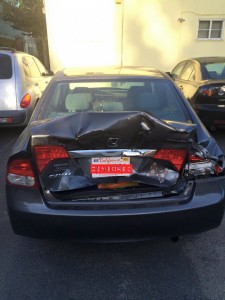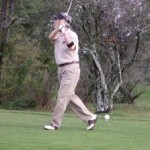The Role of Stress in Our Lives: Seek Control But Do Not Try to Control
 I think most of us can look back at stressful times in our lives and see the silver lining in the dark cloud enveloping our lives at the time. Personally, there have been several stressful events in my life when this was the case. To name a few I would include my divorce, a not expected heart attack, and most recently, the long recovery from an Achilles rupture, and the subsequent rotator cuff injury from walking on walkers and crutches. I am sure there will be more stress to face but I am trying to insure I will not bring anymore on myself.
I think most of us can look back at stressful times in our lives and see the silver lining in the dark cloud enveloping our lives at the time. Personally, there have been several stressful events in my life when this was the case. To name a few I would include my divorce, a not expected heart attack, and most recently, the long recovery from an Achilles rupture, and the subsequent rotator cuff injury from walking on walkers and crutches. I am sure there will be more stress to face but I am trying to insure I will not bring anymore on myself.
This leads me to a key component in coping with stress that states: “seek control but do not try to control”. With regards to my divorce, my failure was to control how I dealt with my anger. To put it more succinctly, I bottled my anger for years toward my wife because I was a conflict-avoider. Did I know that intellectually? I did, but I did not seek control until my anger-controlled me contributing significantly to the marriage not working. I could have had the courage to more consciously embrace my repressed anger by seeking help that may have made a difference. The silver lining is that I am now happily remarried for over 22 years and I am no longer a conflict-avoider. Well, not as much, my wife would say.
In regards to my heart attack, I did not see it coming. I was far from living a perfect lifestyle but I was not that different than many other folks. I was actually working out at the YMCA, and just before finishing my workout I began to feel nauseous. After doing the typical first aid remedies for nausea I began to feel a tingling down my left arm. That’s when I knew something is wrong here. To make a long story short, I ended up at DeKalb Medical Center ER and was in the midst of having a heart attack. After getting a clot buster, (which worked fabulously) and two heart catheters, no other procedures were necessary. I was treated with bed rest for two and a half weeks, I-V Heparin drip, Coumadin, and other medications. I am embarrassed to say that for eight days prior to my heart attack I had not taken my blood pressure medicine because I had run out and my physician was out of the country. A poor excuse, huh? This was another case of where I could have sought control by getting my blood pressure medication by simply calling my doctor’s office. But the silver lining in this cloud was I was able to avoid having a stent, which at the time was a brand new procedure with complications. Also, it pushed me to seek information about cardiovascular disease and peek out from under my denial. And most noteworthy, it led me to become more of an expert on stress control leading to my involvement with Wellstar’s Cardiac Rehab Program where my wife and I conduct their stress reduction program.
My most recent obstacles have been because I tore my Achilles tendon in late November 2014. My pattern is consistent. I hobbled around for at least two weeks with my Achilles hurting, preventing me from going up on my toes. I kept icing the tendon hoping it would magically get better. I even stupidly got on my elliptical at one point, pretending it did not hurt as bad as it did so I could get in my exercise. Well, once again my old pattern of denial was the proverbial being shot by an arrow of truth into my Achilles. I had Achilles tendon surgery on December 9th, 2014 and now it is May 21, 2015. The surgery went well and I am in physical therapy with positive results. I still can’t walk without a slight hitch but it is getting better.
Having to be in a cast and boot triggered rotator cuff problems. Now, I often wonder: if when it first began to be sore back in the summer of 2014, if I would have gone to the orthopedic surgeon and he would have put me in a boot and told me I could not exercise for six weeks. I probably could have avoided the surgery and the issues with my rotator cuff. I once again did not seek the control I could have easily implemented. The silver lining is I think this Achilles tendon nightmare has taught me to actually listen to my body and not deny my age. Accept age as a wisdom booster and not as a challenge to prove I am still the young warrior I used to be.
Having said all this, none of us are able to avoid the proverbial “bolt from the blue”. Stuff happens we cannot control even if we wanted to. However, we can seek control by being aware of our personal vulnerabilities and weaknesses.
Two systems affected by stress are our immune system and our cardiovascular system. Without going into a lot of detail, stress causes our body to release cortisol. Studies have shown with acute stress this is not a problem. Most people don’t know that when we are under acute stress our immune system basically shuts down until the stress response is over. In a situation calling for us to have to run or fight, we don’t need our bodies fretting over catching an opportunistic virus. But when our bodies are under chronic stress, and the immune system is not fully operating we open our bodies to all kinds of threats. Regarding our cardiovascular system, when under stress cortisol and catecholamines are released into our blood stream. Again, under acute or short-term stress situations these chemicals in our blood stream are not a major concern. However, under chronic stress these chemicals scar our arteries making them sticky and more susceptible to collecting plaque.
Prior to my heart attack I was under chronic stress. I had been through an awful divorce two years before; I owned a house that had depreciated significantly since the purchase. Just six days after the house was sold is when I had my heart attack. So while there is no definite scientific evidence as to what caused my heart attack I’m convinced the chronic stress I was under and the fact that I had failed to take my blood pressure medication for eight days had a lot to do with it.
Stress is not the cause of problems in our lives; it is the inappropriate response to the stressor that is the problem.
A good example is: it is not the traffic jam or losing our keys it is the way we respond to either of these situations that is most important.
In my life, and maybe yours, we need to learn to reduce the stress we can control so we will be emotionally, physically and mentally strong to deal with stress we cannot control.






